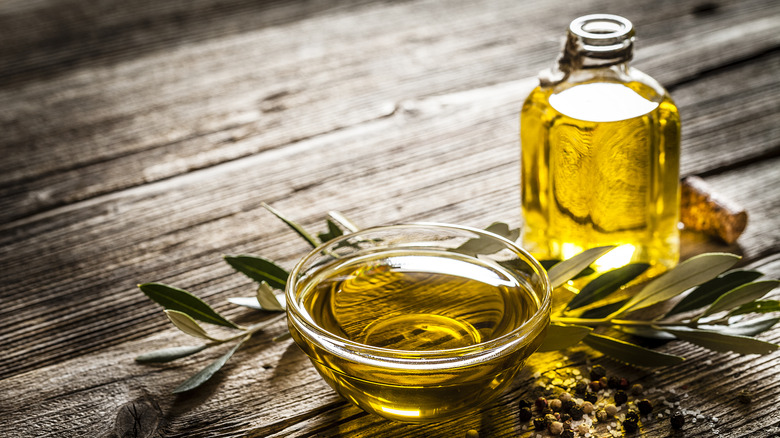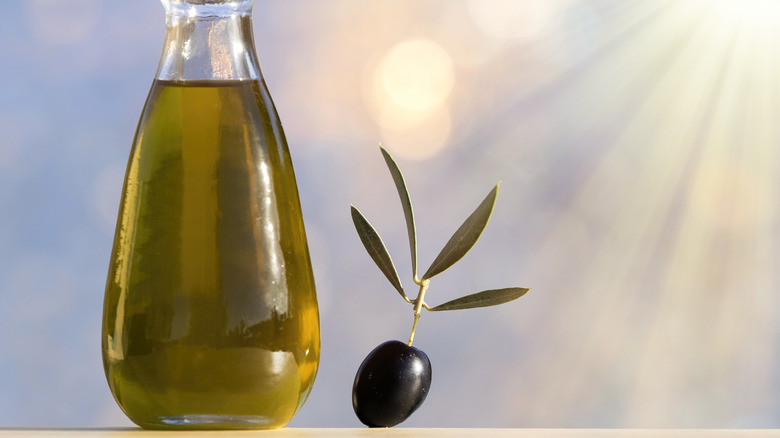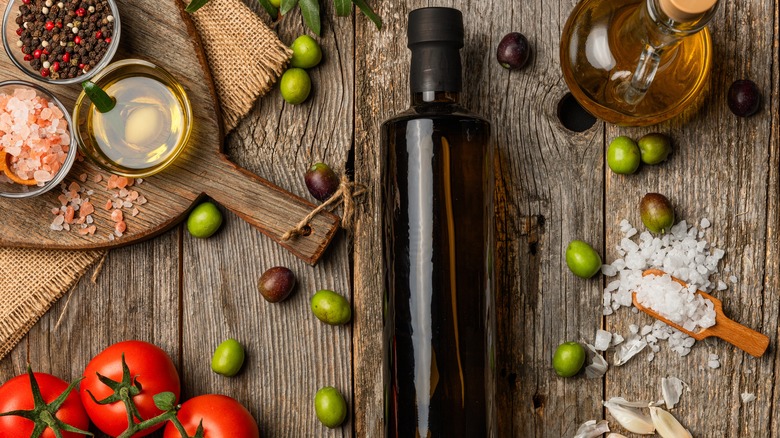When Storing Olive Oil, Remember The HALT Acronym
When it comes to kitchen staples, olive oil is here to stay. Anyone who has any doubts that this trendy liquid can remain secure in its place among the pantheon of must-have kitchen essentials should consider the fact that olive oil has truly ancient origins. Olive trees have been on earth longer than people have and humans have been using olives and their oil for around 100,000 years. More recently, science has confirmed exactly what elements can make olive oil spoil quickly and the good news is that they're easy to remember with the help of a simple acronym: HALT.
HALT stands for heat, air, light, and time, all of which are mortal enemies of olive oil. And that's kind of in a literal sense because these four factors cause key components of olive oil, including chlorophyll, flavor molecules, and antioxidants to break down. That's one of the reasons why you should think twice about buying olive oil in clear bottles. Since it's packaged, when it's been exposed to the first three of these elements it can have a head start on going rancid.
Fortunately, it's pretty easy to avoid turning your olive oil from a delicious ingredient to something that adds a distinct and unpleasant crayon-y taste to your dinner. Store it properly, use it promptly, and you'll be fine.
Here's the science of what happens to improperly stored olive oil
The first letter of our HALT acronym also happens to be one of the easiest mistakes to make with your olive oil. We all know how hot kitchens can get and when olive oil is exposed to that heat, it can actually cause the molecules that give the oil flavor to start to decompose. These molecules are so delicate that they can start to degrade on the counter during a hot summer day.
Air and light are also two factors that target valued properties of olive oil, specifically, taste, smell, and antioxidant properties. It's the antioxidants in olive oil that are linked to benefits such as lowering the risk of things like heart disease and certain types of cancers, as well as fighting chronic inflammation. Exposure to air starts breaking down those valuable antioxidants and as for light, that does some serious damage to olive oil's chlorophyll content. That's part of what makes olive oil so flavorful and when it starts breaking down it'll change taste and smell.
Even stored properly, olive oil does have a shelf life, which makes time the final enemy. It can, in theory, be good for up to four years but for the sake of freshness, you should only buy what you plan on using between 18 and 24 months. If you're looking at extra virgin olive oil, plan on using it within a year or 18 months at the very longest.
Keeping your olive oil fresh is easy
Fortunately, it's easy to properly store olive oil so it stays fresh. First, avoid storing it near your stove or in direct sunlight. In fact, if you live someplace where you often find the heat in your house getting to be too much for you, it's too much for your olive oil. In this case, you can keep it in the fridge.
However, that's only if you're looking at some extreme ambient heat. In most cases, a cool, dark cupboard, pantry, or cabinet is fine. For an extra layer of protection, use dark glass bottles or stainless steel to protect from light, and what about air? Choose small containers and you may even consider transferring some to a spray bottle for daily use.
It's also worth mentioning that when it comes to time, you shouldn't go by the day or month that you bought your container of olive oil and cracked it open. It starts to age from the day that it's processed, so check the dates and use this trick to read olive oil labels properly. Good olive oil should have a "harvest date" listed, which is the best way to tell precisely how old it is. Some experts suggest only buying the amount that you plan on using within six months, as there is no way to truly fight time.


